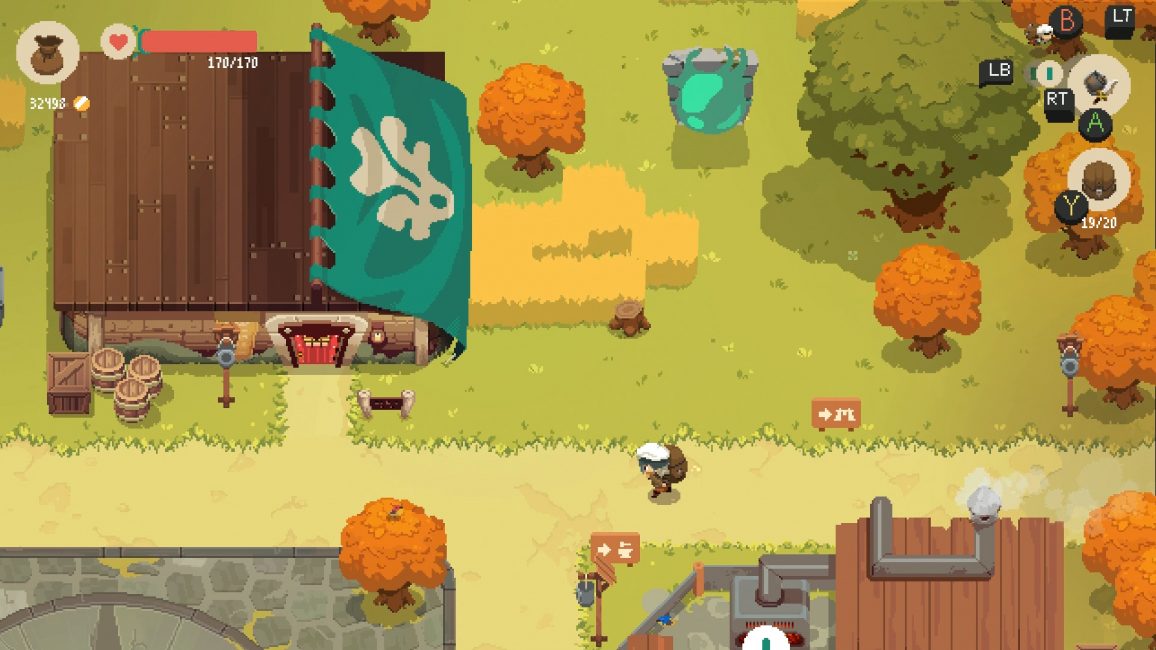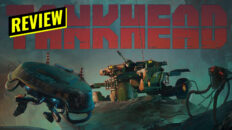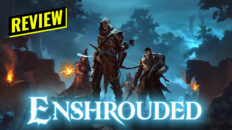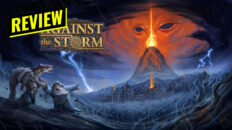Developer: Digital Sun
Publisher: 11 bit studios
Reviewed on: PC
Code Received.
Moonligher tries to solve a problem that often plagues modern roguelikes. By breaking up the tedium of dungeon crawling with shop management, it literally brings value to the items you collect on your dungeon runs. Both sides of the game are well thought out and executed, even if neither brings anything new to the table. But an amazing visual presentation and moving soundtrack help tip the odds in Moonligher’s favor.

You play as Will, the white-haired proprietor of Moonligher: The only shop left in a small town that’s seen better days. Tasked with manning Moonligher by day, by night Will must scour the mysterious dungeons outside of the town for items to fill his store’s shelves. A haunting vision keeps Will moving forward as he knows his destiny is to eliminate the evil residing deep inside these dungeons.
Moonlighter’s dungeon diving will be instantly recognizable to anywho who’s played the Binding of Isaac.
This day-night cycle makes up the overall loop of Moonlighter. You will need to collect items in the four main dungeons of the game, then bring them back and sell them. The money you make is then spent on various upgrades. You can upgrade your equipment to get further into the dungeons or you can spend your money to bring various merchants to your town. Some of these merchants are key to making progress like a blacksmith that lets you buy and upgrade your weapons and armor. Others are less important like a retailer who upsales various items that may be difficult to acquire otherwise. Early on the cost of everything seems staggering, but it becomes easy to earn a small fortune once you setting into the game’s flow.

Moonlighter’s dungeon diving will be instantly recognizable to anywho who’s played the Binding of Isaac. The dungeons are a series of procedurally generated rooms broken up into floors. Each dungeon concludes with a final boss. Every time you die, or leave the dungeon, you have to start over from the first floor with death resulting in the loss of all the items you’ve collected. This leads to a constant battle of risk vs. reward. You’re inspired to push forward, but doing so may result in an untimely death and a wasted run.
Moonlighter unfortunately falls into the typical trappings of these types of roguelike dungeon crawlers. If you happen to get stuck on a particular dungeon, and are forced replay the same levels over and over, you may feel like you aren’t making any progress. And while the dungeons are technically laid out differently every time you enter, you will begin to notice the same room layouts and enemy placements. Thankfully these moments of tedium are few and far between because even the smallest equipment upgrade can have a significant impact on the combat.

Speaking of combat, Moonlighter features a fairly straightforward combat system. You have a basic attack, a special attack, and a dodge roll. Each weapon has a different special attack. For instance the sword and shield’s special is a block, but the bow’s special is a charged shot that can pass through objects to hit enemies. The dodge roll is also key in avoiding certain attacks as well as jumping over small gaps in the floor. While simple, the combat does open up once you start upgrading your weapons and choosing your play style. Upgrading your armor is also important as it is the only way to increase your overall health.
The other half of Moonlighter is shop management. After scouring a dungeon you have to bring your items back and sell them in your store. After choosing which ones to hold onto and which one to sell, they go on the shelf and wait for a prospective buyer. You have to set the price of each item, and as customers peruse your wares they will smile, frown, or cry based on whether the price is too high or too low. Thankfully the game keeps track of the ideal price for each item, so it makes restocking your shelves easy.

Much like the dungeons, this portion can also get tedious over time once you figure it out. There’s very little nuance to setting prices and while you can raise them based on popularity, the amount you stand to make is rather insignificant. You do have to keep an eye out for thieves, however, but even that wears thin after a while. Thankfully these merchant segments are short and are accompanied by a pleasant tune.
The game’s pixel-art art style compliments the game’s stellar soundtrack.
In fact, all of the music in Moonligher is outstanding. The jolly tunes that follow you around town are contrasted by darker tracks that set the mood of each dungeon. These theme songs match each dungeon’s aesthetic, with each floor featuring a slightly tweaked version of the main theme. I found myself humming the music that plays in your shop long after I put down the controller.
The game’s pixel-art art style compliments the game’s stellar soundtrack. It may not do anything unique, but it is remarkably detailed and gives the game a soft, fantasy look. The dungeons are where the art really shines. From the man-made stone structures of the golem dungeon to the organic, living walls of the forest dungeon, the visuals never get boring. The enemy and character designs are also great, allowing you to immediately identify threats upon entering a room. I just wish you interacted more with the citizens of the village because visually they are all distinct and expressive, but don’t have much to say.

Moonlighter is a tale of two games, one roguelike dungeon crawler and one shop management simulator. It tries to break up the monotony that often plagues roguelikes by mixing in simple shop keeping segments. By and large it succeeds in its goal, but can still fall into a loop of repetition that may or may not be what you’re looking for. That said, it’s charming as hell, looks and sounds great, and even plays great once you get into a groove. So if Moonligher’s biggest crime is that it can be a little boring, then to me that’s far from a deal breaker.









